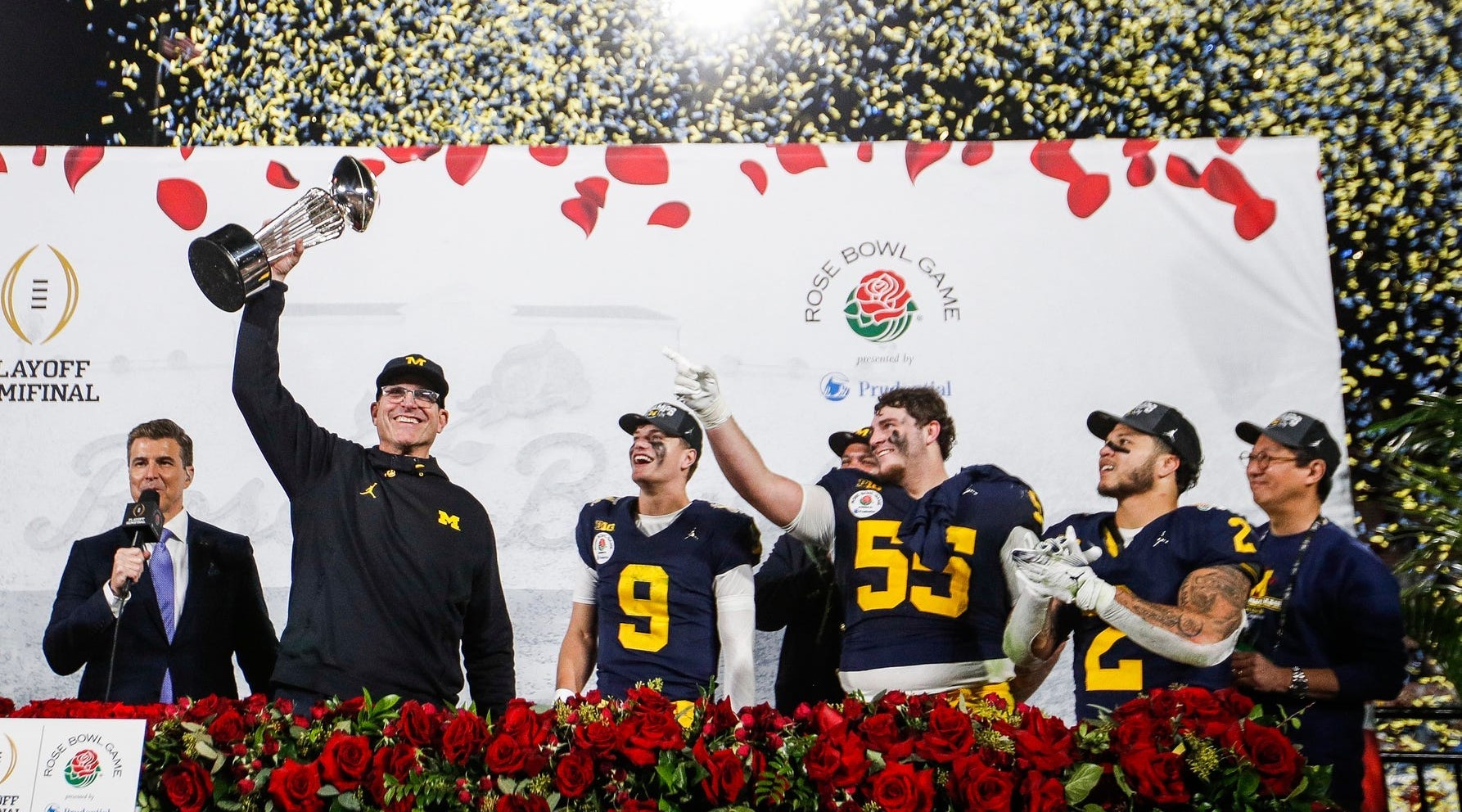
The SEC isn’t going anywhere, but the new-look Big Ten is a worthy threat
By Paul Harvey
Published:
Death, taxes and the SEC winning the national championship in football. That’s the status quo that has dominated the sport dating to the BCS era.
However, on the eve of another crossroads in the sport, the Big Ten (and future Big Ten) delivered a shocking turn of events in the College Football Playoff. “Shocking” is probably not the right word for anyone who spent the 2023 season intently watching Michigan and Washington, but it fits the bill for the rest of the country.
Despite an undefeated season and dominant defense, Jim Harbaugh’s program headed to the Rose Bowl as a slim favorite over Nick Saban’s Alabama squad. Then, the Wolverines endured numerous doubters and questions about an underdog status as the No. 1 seed in the country.
To be fair, those doubts and questions for a team facing Saban would be accurate in many other seasons. But this year, the Crimson Tide clearly looked like a team that overachieved with an SEC title, and Michigan confirmed that status in the Rose Bowl.
Out west, Kalen DeBoer led Washington to a similarly undefeated record with a Pac-12 title as the Huskies defied the odds at every turn. The sad irony of the 2023 season is that the Pac-12 was the deepest league in the country in its swan song, yet the Huskies conquered all challengers.
Even in the face of that dominant run behind Heisman Trophy runner-up Michael Penix Jr., Washington entered the Sugar Bowl as the underdogs against SEC-bound Texas. Ultimately, that didn’t matter as DeBoer and Penix dialed up another master class to take down Steve Sarkisian and the Longhorns.
Those semifinal results also upset the apple cart of conventional thinking across college football. Regardless of your allegiance, much of the country appeared intent (or resigned) on seeing a Texas vs. Alabama rematch in the national final. (Texas beat Alabama 34-24 in the regular season.)
It’s not hard to see why many people expected that as a continuation of old-school SEC power and a soon-to-be new kid on the SEC block. The SEC won 13 of the previous 17 national titles, including the past 4. It seemed fitting that the league would usher in the changes of 2024 with another dominant end to the football season.
However, Michigan and Washington had other plans. No longer was the top Big Ten team a punching bag for the SEC in the national spotlight. And the Huskies, destined for the new-look Big Ten with Oregon, USC and UCLA, showed DeBoer has the chops to coach his team alongside the best in the country.
What does the future hold for these programs and the two marquee conferences moving forward? That’s undoubtedly a debate that will rage nonstop this offseason, but there are some clear takeaways with Alabama and Texas joining the rest of the country watching the CFP National Championship at home.
For starters, the Big Ten showed the new 18-team version of the conference will have all the firepower it needs to close the gap with the SEC as the preeminent title winner in college football.
Let’s be clear: The SEC’s stranglehold on college football is not going to disappear overnight. We encountered a similar national championship game in the first season of the Playoff in 2014 with Ohio State beating Oregon, and we all know how the SEC responded. Three different SEC programs (Alabama, LSU, Georgia) combined to win 6 of the next 8 titles.
And, in terms of producing the most NFL talent, the Big Ten is probably not going to run down the SEC any time soon. College football is undoubtedly built on recruiting and NFL-caliber players, but it’s far from a guarantee, particularly in an expanded Playoff.
After all, we have always seen one bad game has the potential to doom a season. Skeptical?
Few people expected Georgia’s undefeated season and dominant stretch to end with an inexperienced and seemingly outmatched Alabama squad. Sure, we can say that was the Nick Saban impact … but Michigan did not have an issue with that Saban impact in Pasadena.
In an expanded Playoff, it stands to reason the playing field will level out a bit. The deeper and more talented teams will always have the advantage, but winning more games includes added chances for peril.
At the same time, rest assured that the SEC is not going away. I know that’s not rocket science, but it bears stating with the way this season is ending.
When Monday night’s game kicks off, it will mark the first season since 2018 that the national champion is not an SEC team. It will also be the first time since the 2014 season and inaugural Playoff that an SEC team won’t be in the title game.
By all accounts, there’s every reason to believe the SEC returns to form next season. Georgia, Ole Miss, Missouri and yes, Alabama, will make sure of that.
Still, what was an annual guarantee for the better part of a decade (the SEC playing for a title) feels less sure than ever moving forward. As college football continues to shift into an era expected to be dominated by the SEC and Big Ten, there are a lot of reasons to be optimistic for the league that spans coast to coast.
Regardless of who wins Monday night, the Big Ten is the ultimate winner. And the SEC will have to watch it from home.
Paul Harvey lives in Atlanta and covers SEC football.







